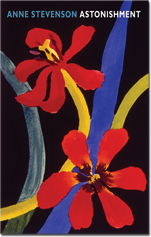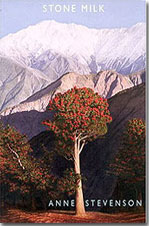Selected Poems
Before Eden
(For Paul Stangroom)
A day opens, a day closes,
Each day like every other day.
No day is like another day.
A wave crashes, a wave caresses,
Each wave like the next wave.
None sweeps the same arc on the sand.
A wall fixes its belt to a hill
As a mason fits stone to hand.
No stone's like any other stone,
And every stone has a like stone.
Why should another spring surprise me?
The gorse still erupts from the scrubland,
The gulls again screech to the landfill.
What claims identity
That isn't self-propelled, vicious, multiple, alone?
Think of how it was before Eden.
God held his breath,
The fresh-moulded clay in his hands,
Hesitating between dream and achievement.
The mountains were there,
Fixed in a clear, viscous element
He would need to exchange for air.
Trees flowered, gorgeous as palaces,
All without fruit, without rot.
Had bacteria and seeds been invented?
Yes, but they didn't have uses.
The birds and creatures were there,
Evolved already in his mind,
Lifelessly waiting while
The pivotal question tormented him:
What kind of nature did he want?
Once he'd breathed life into Adam
He knew he couldn't take it back.
He himself might have to be
Re-created, risking
His hand crafted system, risking death.
No life without birth.
No growth without waste.
No first step without a last.
It was such perfect weather,
The sparkling morning of the sixth day
When God in his pride looked over
His hard week's work, saw that it was good.
And hesitated.
If the sky had admitted one cloud,
If the mountains had understood
The whispering ice,
Or loved the moulded nature of being;
If a bird had cried out, or if
A locust had filleted sound,
Or if terror had said...
He might have thought the fifth day would suffice.
But the Gipfeln nursing the rhododendrons,
Even the Tree of Knowledge, said nothing.
It was silence that broke him in the end.
With every perfect day identical
No animating evil could arise.
So God bent down and sighed the words
"I will,"
He spoke, and Adam opened all his eyes.
After the Fall
Adam: Lady,
I've not had a moment's love
Since I was expelled.
Let me in.
Eve: Lord,
I've not had a moment's rest
Since I was a rib.
Put me back!
To Phoebe at Six Months
How in this mindless whirl of time and space
Find words to welcome one small human child?
Shakespeare was lucky; art wore Shakespeare’s face,
And Nature kept the virtues neatly filed.
God’s earth was fixed, and round it ran the sun,
A temperamental lantern on a skate;
Our lives by stars were wound up or begun,
The universe was Heaven’s unspoiled estate.
But now, lost to the angels, it appears
We share with rats and fleas, a murky source.
Our plaited genes mean nothing to the spheres;
Contingency, not prayer, will plot your course.
Yet no small Phoebe, circa 1603
Was ever free to be what you shall be.
The Loom
I drowned in sleep.
And once my lungs were gills,
I watched my liquid shadow,
fathoms deep,
Weave through a trembling warp
of light and hope
a weft that kills.
No working hand
Had anything to do
with how the sea
Hurled itself in salt against the sand,
or how unfeelingly
The shore forgot to be land
and mimed the sea,
Or how, under the dream,
One tightening thread
Gathered those crooked strokes of light
into a beam
Through which I rose – not quite
from the dead,
more from the blame
Fanned out in
Micro-shards of extinct species
threatening my head –
Motes that might have been
curses, or killer faces,
Had they not welcomed me, as I woke,
with human voices.
Teaching my Sons to Swim in Walden Pond
‘We must look a long time before we can see.’
Henry David Thoreau
Dark woods, deep pond;
pond locked in the woods,
woods looking up from the pond.
End of summer’s oak-green, birch-wan,
hickory, pitch pine, alder almost purple.
September growing skyward upside down
in water hearsay swore was ‘bottomless.’
The poet-scientist plumbed it, simple
with fishing-line and stone:
one hundred and two feet deep, plus
five feet not to be explained
by inflows feeding it, outflows voiding it.
The pond was measurable.
Its voice, immeasurable.
*
It’s not so difficult to swim. Shall we begin
our lesson in the changing room?
Off with your clothes, then: tee-shirts, jeans,
slogans, logos, trainer socks and shoes.
Abandon your watches, music machines,
ear pods and mobile phones.
As soon as you’re fit to be fish,
ease the weight off your bones.
Equip yourselves, scaled and finned,
for a cool trip home.
In lesson two – spacing your bodies out –
we’ll practice staying afloat.
Don’t fight with feet or hands or head
your mother element.
Behave like a fallen leaf. Believe in lying down.
That’s it! That’s it!
Let this rock-a-bye water be your bed,
your muscles’ memory, your boat.
Forget how to walk, forget to doubt.
Forget to drown.
Lesson three has to be about air,
plain air. You think it’s free?
Try breathing when it isn’t there.
You’re sputtering. Can’t speak, can’t see?
Can’t live without air? You’ll have to save it, then.
Breathe in, breathe slowly out, breathe in,
but only when you surface. Yes!
Learn from the otter and the marsh hen
how to steal through water like grease
on a ribbon of silence.
There! How easy. Soon, with practice,
you’ll be swimming – oh, not perfectly,
but maybe well enough to burrow under water,
open your eyes and see
beneath its sleepy unstoppable simmer.
Let’s pretend this pond is an ancient ocean.
You have just been born.
You don’t know it yet, but you’re human.
The air hurts your lungs; the water hates them.
Where do you belong?
On land? In water? In between?
Anywhere that doesn’t hurt, you say.
Pooh! Everything to do with learning hurts.
Put it another way. No creature swims
that doesn’t need to swim, except us
who swim for fun, for play.
The mallards, the nervous little minnows, muskrats,
frogs, even the mosquitoes and skater-bugs
belong to the pond on which their lives depend.
Doesn’t it rightfully belong to them?
Thoreau thought naming as good as owning.
Words were for him divine currency.
Hating his neighbours’ small-mindedness and greed,
he camped in the woods, looked until he saw
the Highest Mind made visible in Nature,
then willed America’s wilderness to poetry.
What else could it belong to after him?
To Indians his fathers stole it from?
To farmers stripping the forest as their right?
To Massachusetts’ World Heritage Site?
Of course, Walden belongs to nature, like the trees.
But isn’t everything we see in nature
known by how we name it?
You say nature was ‘better’ before we splashed in,
big heads stuffed with our own stories,
languages to make them happen.
What if – at some road fork in evolution–
we’d taken instead the dolphin’s way?
The seal’s, the otter’s? We need to swim
to keep that lost road open.
Look at the time – how late it is. Before dark,
we’ll need to put our clothes on,
pick up our picnic litter, towels and toys
and head for the car park.
Before we do, though, turn back
to watch the day’s last hatch of insects
jet-streaming to their deaths across the pond.
You have to hear with your eyes
to see the sunset talk with its reflection
in those mauve gold clichés.
Now the tourists have taken their voices home,
the crickets’ thin pulsing chorus begins.
Listen to the ripples whispering to the stones.
Thoreau would have heard them
after the hoot and rattle of the night express
released him to the screech owls
moaning to each other across the lake like fallen souls:
“Oh-o-o-o-o that I had never been bor-r-r-r-n!”
With Boston already baying in the distance,
closer and louder every night, closer and fiercer.
For Kari Furre, supreme swimmer
Constable Clouds and a Kestrel’s Feather
England still moulds them as Constable saw them.
We see them through his eyes –
loaves fresh kneaded for the oven,
veils of gauze,
flat-bottomed continents, creamy islands
floating on glass. As a child
did you never play the cloud-zoo game
on summer days like these?
Lie prone on grass,
stalk in your mouth, face to the sun,
to let imagination run wild
in a sky full of camels and whales
where the air-show today
features fish evolving into crocodiles
disintegrating slowly
into little puffs of sheep grazing on air.
Now a tyrannosaur, chasing a bear...
or is it a white bull? Europa on his back,
panicking to disappear...
Here's a cloud that Constable never knew.
Two chalk white furrows are being ploughed
straight as rails across the high blue
hinterland of my childhood zoo –
a plane from somewhere, going somewhere,
leaving its spoor of vapour on the air.
As the trailing furrows widen,
waves form a lingering wake from a prow
in perfect rhythm, like a feather's pattern.
And still you keep your head down,
eyes vacuuming the turf,
nose to the ground,
intent on ants and other centaurs
in their dragon world, their home
here thatched with a found
feather – evidence of hunger's habits
in this summer field.
A kestrel's, female you guess,
stroking the patterned vanes
locked to the shaft:
13 square bars, dark, on the outer side;
13 wavy lines, woven on the inner side,
a russet, bow-shaped, undesigned design
perfectly aligned – not by craft,
but by a mathematics of its own –
proof that, undeterred by our millennium,
nature's nature is to work in form.

